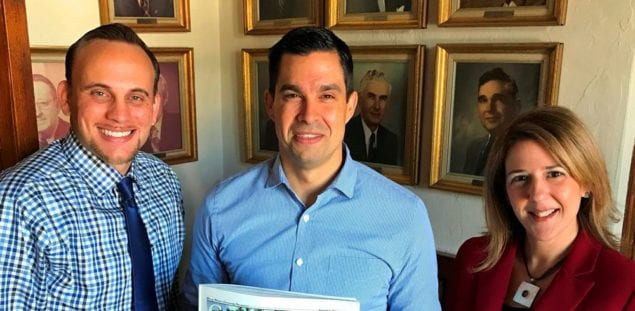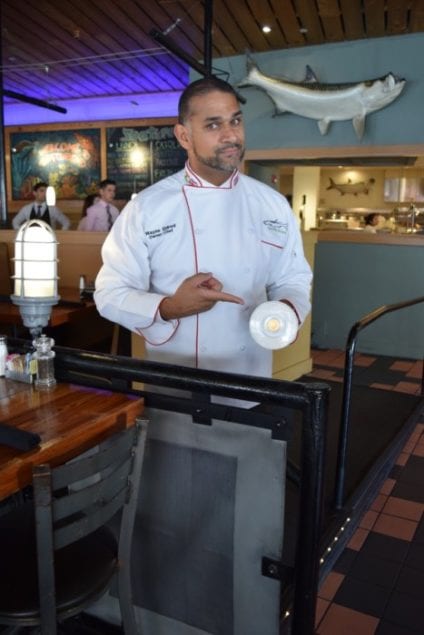The City of Coral Gables recently got a green light from the courts to proceed with a program to ban commercial use of expanded polystyrene, better known as Styrofoam.
It is part of a long-awaited plan introduced by City Commissioner Vince Lago that further demonstrates the City Beautiful is serious about protecting the natural environmental.
It has been about four years since this lifelong Gables resident stepped into City Hall as a first-time commissioner with a mission to change people’s perceptions that his city is lagging in sustainability and environmental protection.
As a child, he loved the miles of coastal waters around Coral Gables and the pine rocklands in the San Amaro neighborhood where he grew up.
And he still does — deeply.
So despite heavy push back from special interests, corporate lobbyists, and some state representatives against his municipal ban on Styrofoam takeout containers and coffee cups, Lago is staying the course to ensure Coral Gables continues to emerge as a leader in environmental protection.
“The perception was that Coral Gables was turning a blind eye to environmental causes, but you can’t be the City Beautiful without actually putting your money where your mouth is,” he said.
“As an elected official, it’s not just about ensuring we do no harm to the environment; it’s about ensuring and preserving our responsibility and indeed our obligation to lead by example — and there can be no excuses,” Lago added.
Lago has spearheaded multiple successful efforts at the city level including the establishment of Coral Gables’ first-ever Sustainability Master Plan and the purchase of 20 all-electric vehicles and charging stations.
He also changed the process for future homeowners allowing them to get Coral Gables solar permits “for free” as an incentive. Most recently, he led the way in a commission action that will ultimately result in a citywide ban on the use of single-use plastic carry-out bags.
“All of these actions serve to assure people that we are moving in the right direction. It instills the idea that ‘if my city is doing it, I can do it too.’”
So when Coral Gables’ ban on use of expanded polystyrene came under attack last year by special interest groups and the Florida Retail Federation — right in the middle of the city’s legislative and outreach process — Lago and his fellow commissioners vigorously fought for their “home-rule” right to enact their new Styrofoam rule.
And the city won.
Just weeks ago, Miami-Dade Circuit Court Judge Jorge Cueto ruled to uphold Coral Gables’ ban, saying that the city not only has the right to create its own rules for governing, but that a state law enacted in 2016 specifically targeting Coral Gables from enforcing its ban was unconstitutional.
This new state law, pushed by major retailers like Publix and 7-Eleven, prohibits any further legislation by municipalities wishing to ban the use of polystyrenes until a study is done to measure the impact of such rules on food safety. The law also is said to help mitigate concerns by retailers that there are too many differing regulations across municipal and county lines.
But Lago and other city leaders see the most pressing issue surrounding Styrofoam plates, cups, egg cartons, and take-out containers is that they are simply not recyclable. And that’s because there is virtually no market to recycle such plastic-based products as polystyrenes due to their weight, or the lack thereof.
It also breaks up into thousands of little pieces and becomes a major nuisance for sea turtles, fish, and birds, and in some cases causes death. And the expanded polystyrenes that do go into the waste stream last for up to 500 years before biodegrading.
Even without the legal challenges Coral Gables faced in implementing its ban, it has been a long process to get the rule in place.
In the months leading up to final approval, city staff conducted dozens of meetings with business groups and residents in order to get community buy-in, and they had to set in place regulations related to compliance.
After vetting the rule thoroughly and conducting community outreach, Lago stated that “most everyone came to the same conclusion that it’s really just a matter of ‘lack of education’ that any business would continued using Styrofoam products. We’re beyond using complacency as an excuse. We’re a very civilized society that needs to be accountable to the environment,” he said.
This sentiment has been echoed by dozens of Coral Gables retailers and restaurateurs, such as Wayne Eldred, owner and head chef of Tarpon Bend Raw Bar & Grill on Miracle Mile.
“The elimination of expanded polystyrenes is one of simpler things we can do – it’s a very easy first step leading to the many positive outcomes we could see by putting into place sensible policies and procedures that protect the environment,” he said.
That’s the exact community support and understanding that feeds Lago’s desire to make Coral Gables a beacon of environmental responsibility for other cities to see and exemplify.
“We are leaders on so many fronts,” Lago said. “We are leaders when it comes to municipal design, aesthetics, and the quality of zoning requirements. But great cities not only need to protect aesthetics – they must protect the environment. After all what legacy is there if our environment is destroyed by our failure to act?”








